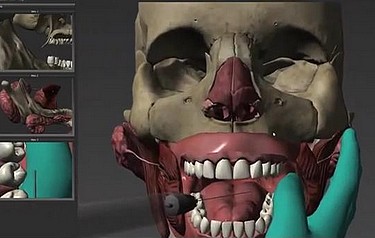 GLASGOW, UK: Researchers from Scotland have presented the world’s first anatomically accurate interactive 3-D head and neck learning resource, which also features an interactive dental injection stimulator.
GLASGOW, UK: Researchers from Scotland have presented the world’s first anatomically accurate interactive 3-D head and neck learning resource, which also features an interactive dental injection stimulator.
With this innovation, they hope to enhance understanding of the anatomy, increase the flexibility of training for health-care professionals and improve patient safety.
The 3-D clinical training tool was developed in a joint research project by the NHS Education for Scotland (NES), a special health board responsible for supporting NHS services in Scotland, and the Digital Design Studio (DDS), part of the Glasgow School of Art.
A cadaver was scanned with a laser at several stages during the three-year project to ensure that all anatomical details were captured in 3-D.
DDS then reconstructed the head and neck, and developed software that allows students and clinical trainees to view, manipulate and interact with a 3-D head in real time, the researchers said.
Using the dental injection stimulator, for instance, students can feel what it is like to give a dental local anesthetic injection and to check that the injection has been administered successfully and safely.
According to the researchers, dentists involved in testing the simulator remarked that even though they had many years of experience they felt more comfortable giving injections having used the simulator.
Moreover, the model includes accurate visualization of the skeleton, nervous system, blood supply, muscles, supporting tissue and lymphatic system.
In the teaching laboratories, students can learn more about the anatomy of the head and neck by dissecting the head and neck, and rotating the head and neck or zooming in on specific areas.
NES announced that it has invested in 3-D teaching laboratories in Aberdeen, Dumfries, Dundee, Glasgow, Inverness and Stornoway to ensure that dental teams and undergraduates are able to take advantage of the new educational resources.
In addition, NES Dean of Postgraduate Dental Education Dr David Felix said that the organization had agreed to invest a further £100,000 to continue the development of the technology.










